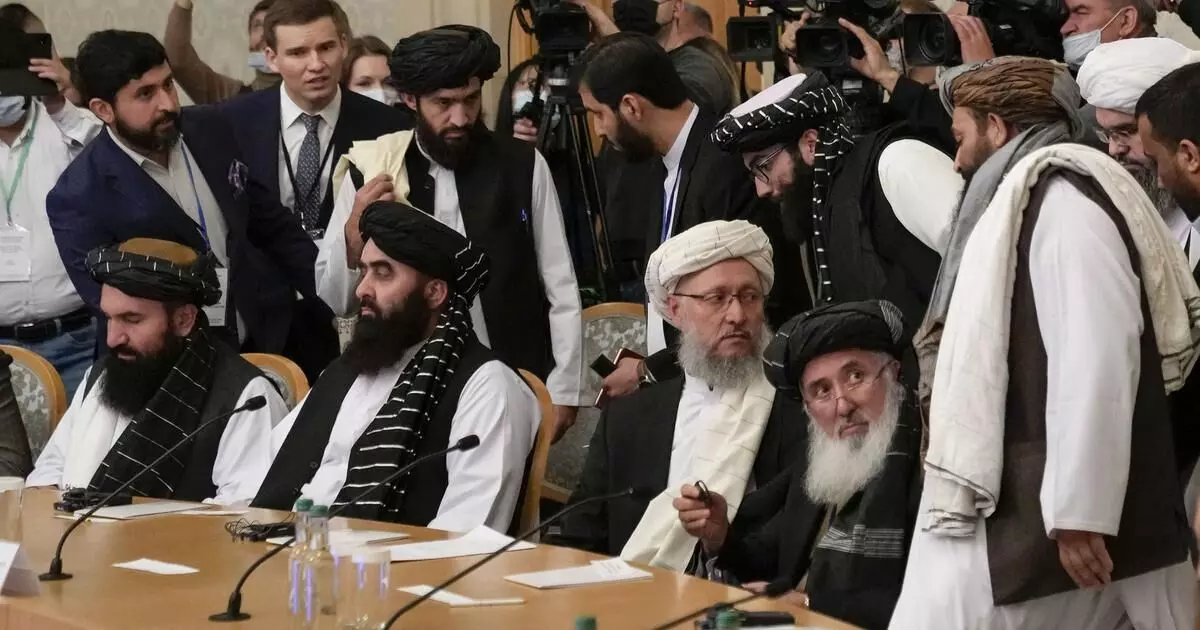
Afghanistan: a testing ground for the Moscow axis
text_fieldsThe decision of the 'Moscow Format' to accept the 'new reality' of change of rule in Afghanistan and to take the initiative to pull the war-torn country out of the tragedy caused by the war of occupation, is noteworthy in many respects. The goal of the third meet of the Format that took place in Moscow on October 20 was to revive Afghanistan, economically back-broken after decades of the occupation and war and to bring the country to the mainstream of the world. The joint declaration issued at the end of the meet recognises that although the international community has not accorded formal recognition to the Taliban regime, there is no way other than recognising the new reality of the Taliban having come to power for making any effective practical intervention in Afghanistan. The meeting, which declared that all the countries at the forum recognize the sovereignty, independence and integrity of Afghanistan, reaffirmed their commitment to help Afghan to move forward making the country free from terrorism and narcotics and protecting of civil rights. The Moscow Format also called for an urgent international aid conference under the supervision of the United National in order to salvage the country whose situation is worsening each passing day. The declaration expressly mentions that the forces that had occupied the country for the last twenty years has a special obligation in the economic and financial reconstruction of the post-war nation.
Moscow Format was formed at the initiative of Communist Russia in 2017 for talks on Afghanistan when the defeat and withdrawal of the US occupation forces looked certain. The forum consists of, besides Afghanistan and Russia, central Asian republics Kazakhstan, Tajikistan, Kyrgystan, Uzbekistan and Turkenistan together with India, Pakistan, Iran and China. Since the facilitation of peaceful transfer of power in a democratic manner was set as the primary aim of the Format, the Taliban also became an integral part of the negotiations. In the historical background of the rigid dominance of extremism, Taliban's ascent to power following the US withdrawal had generated anxiety among the international community. And the Taliban's promises of having changed from what it was twenty years ago, were soon belied by the primitive actions and punishments it resorted to soon after assumption of power. At the same time, big powers that well recognize the strategic importance of Afghanistan have been racking their brains onhow to turn matters favourable to them. Countries like India, who have discarded their old non-alignment policies but yet are at a loss about which side they should lean to, are in some uncertainty. So far India has been toeing the line of the occupation forces including the US and the western powers allied with them. But now India is also active in the platform shared by China, Pakistan and Iran under the leadership of Russia. In addition to the official schedules of the Moscow Format, discussions were also held on the sidelines of the meet between India and representatives of the new Taliban government. India has promised its participation in the reconstruction of Afghanistan and humanitarian aid to the country. And the Taliban spokesman Zabihullah Mujahid has also disclosed that both sides will apprise each other of their respective positions and guaranteed improving diplomatic and economic relations. There are also reports that the first batch of aid in the form of wheat and other food grains have arrived in Afghanistan from India.
The Moscow meet has also reiterated all the points laid down in the Doha agreement between America-led western alliance and the Taliban just before it took over power. The Taliban which keeps asserting that the current government is an interim government has verbally assured this too. But parties to the Moscow axis are of the view that Taliban's assurances can be trusted only when it comes to implementation. At the same time, Taliban representatives have made it clear that its plan is to keep away the western alliance and submit to the conditions laid down by this axis and thereby intensify its efforts for recognition of the international community. If the diplomacy of pressure and assistance by the Moscow Format meets with success, it carries the potential to redraw the future political picture of Afghanistan. All the same, it has been pointed out that the motive behind the Moscow Format's moves is dictated by the strategy of the troika of Russia, China an Pakistan to make the region free from US influence. At the time of planning its withdrawal from Afghanistan, the US had contemplated an interim base in the region. But no one, including India, Pakistan and Iran did not approve of it. As for the central Asian countries, Russia had already roped them in. On the other hand, it was in view of this that the US was warming up to some compromise with Iran. At any rate, the attempt of Russia and China is to recognise the sovereignty and independence of Afghanistan, hold it under their influence and win dominance in the region. The exploration of the Taliban then is whether it can accomplish a sovereign rule in their country with the blessing of the international community by capitalising on the enthusiasm of these countries. And who will win in the race remains to be seen.












